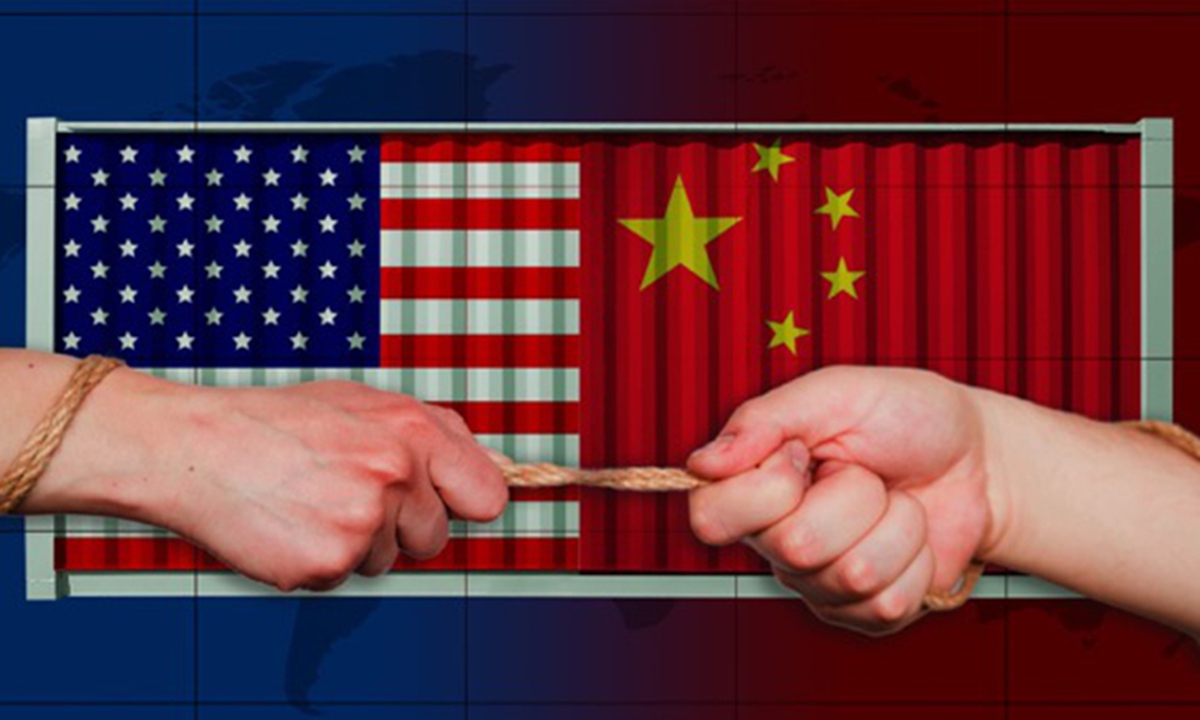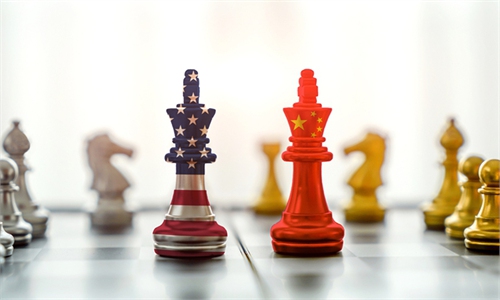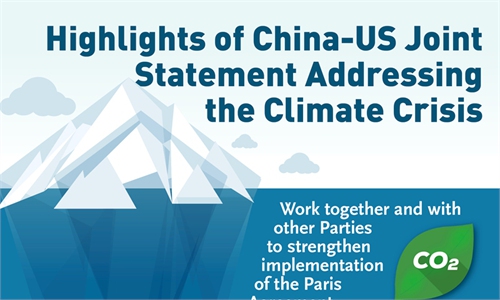China-US game shifts into long stalemate

Photo: GT
China and the US issued a joint statement on climate change on Sunday following US Special Presidential Envoy for Climate John Kerry's visit to Shanghai and meeting with his Chinese counterpart Xie Zhenhua.
This signals some relaxation of the tensions between China and the US. It is also encouraging and represents that the China-US competition has become a protracted war. The two countries need a long time to deal with mutual competition and cooperation.
On July 30, 2020, the Political Bureau of the Communist Party of China Central Committee clearly pointed out that "since many problems we face are long- and medium-term, resolving such problems is like fighting a protracted war." It has been 82 years since Mao Zedong wrote On Protracted War in June 1938. If this "protracted war" is used to describe the China-US competition, then China is no longer in a strategic defense posture, but the two countries are in a strategic stalemate stance.
Over the more than 70 years since the founding of the People's Republic of China in 1949, the US has been on the offensive against China for a long time.
The first round of the US offensive against China began in 1949. This can be called a military offensive that included conflicts with neighboring countries, military blockades and even nuclear blackmail.
China was forced to engage in the War to Resist US Aggression and Aid Korea, as well as operations to assist Vietnam and resist the US. China also developed "Two Bombs, One Satellite" - the atomic bomb (and later the hydrogen bomb), the ICBM and the artificial satellite. China eventually won a huge strategic victory and ensured national defense security.
After the reform and opening-up in 1978, the second round of the US offensive against China began, and it can be called an ideological offensive. Liberalization thoughts prevailed in China together with the drastic changes in the Soviet Union and Eastern Europe. A political turmoil broke out in China around this time, and the country stayed in a passive situation.
But soon, China quickly stabilized the situation after Deng Xiaoping's talks during his southern tour in 1992, and under the guidance of his two-pronged approach of economic development and promotion of ethical values. The reform and development of China's market economy saw the first wave of high growth. Again, Washington's offensive was thwarted.
The third round of the offensive was launched after China's accession to the World Trade Organization in 2001. This can be called the economic offensive.
US companies tried to control China's economic lifeline, and tried to influence the direction of China's economic development through investments, mergers and acquisitions. But tens of millions of Chinese companies, such as Huawei and Tencent, have grown rapidly since then. These companies learned from American companies' advanced management experience, financing methods, and technological research. And finally, they advanced to the world's top companies. There are more than 120 Chinese companies in the 2020 Fortune Global 500 list, outnumbering companies from the US.
The fourth round of the offensive came even harder. After Trump took office in 2016, Washington adopted a diverse offensive against Beijing. Smears through media, technology bans, and tariff increases are included. Despite this, the Chinese government, society and businesses have resisted the pressure. They have become more united and resilient.
As a result, China became the only major economy in the world with positive economic and trade growth in 2020. Currently China's economy remains firmly in second place in the world. And it is expected that China will overtake the US as the world's biggest economy by 2028, according to the London-based Centre for Economics and Business Research.
The US has not gained any substantial benefits from the four rounds of offensives. Meanwhile, in the face of US' offensives, Beijing's ability to play the game against Washington has grown by leaps and bounds. Now, it is reasonable to believe that China's strategic posture against the US is no longer only in a defensive position. The relationship of the two countries has shifted into a long stalemate phase.
The main characteristics of a "stalemate stage" can be summarized as the three "same levels."
First, economic scales of both countries are at the same level. China and the US are the only two countries whose GDP stands at over $10 trillion, has domestic consumption that exceeds $5 trillion, and trade volume surpassing 4 trillion. Other countries, including Japan, Germany, obviously will stay at lower levels.
Second, the militaries of the two countries remain at the same level in certain region. China's defense budget in 2021 will be around $200 billion. Although US annual defense spending is over $700 billion, as its troops are deployed across the world, the country lacks absolute military might to crush and contain China in the Western Pacific. In East Asia, China's military strength is roughly equal to that of the US.
Third, the global attractiveness of both countries' development models is at the same level. In recent years, the appeal of China's development model is shaping up to be similar to that of the US model decades ago. Judging from China's successful development experience over the past 40 years' reform and opening-up, many developing countries have seen an alternative that differs from Western development model. Many countries speak highly of China's recent success in terms of infrastructure, social security, financial stability, especially the governing vision that puts people first. This was fully displayed in the fight against the COVID-19 pandemic.
We must acknowledge that in the future that neither China nor the US can defeat the other. Both countries will have to adapt to major changes in their strategic postures. In the long-term stalemate, we will see tensions and relaxation, competition and collaboration coexist. This will become a new normal in their bilateral relations. Everyone needs to adapt to this.
The author is professor and executive dean of Chongyang Institute for Financial Studies at Renmin University of China. wangwen2013@ruc.edu.cn




